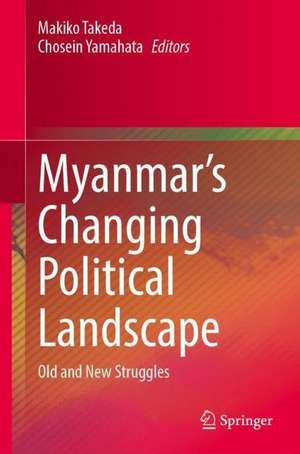Myanmar’s Changing Political Landscape: Old and New Struggles
Editat de Makiko Takeda, Chosein Yamahataen Limba Engleză Hardback – 6 apr 2023
Myanmar has faced numerous divisions that hinder its democratization and peacebuilding processes since emerging out of decades of military dictatorship. The coup d’état in 2021 terminated Myanmar’s limited and nascent democratization under the civilian leadership of the National League for Democracy (NLD); not only did the coup regime resurface old struggles, but also created new ones.
Against the backdrop of Myanmar’s changing political landscapes from military to quasi-civilian to civilian rule in 2016, and back to military rule in 2021, the book discusses the various forms of interconnected struggles, both old and new. In this process, the contributed chapters come together to highlight the changing dynamics of stakeholders, relations between agents and beneficiaries, and the generated evolutionary processes in Myanmar’s democratization and its reversal.
This book brings an even mix of researchers both within and outside of Myanmar to critically discuss how different agents and their interactions, in the form of center-periphery as well as state-non-state relations, continuously shape today’s political landscape. Its interdisciplinary composition also invites readers from various backgrounds to grasp with engaged research that identifies the various challenges and addresses ways in which to facilitate change from local and international perspectives.
Preț: 786.88 lei
Preț vechi: 959.61 lei
-18% Nou
Puncte Express: 1180
Preț estimativ în valută:
150.58€ • 156.26$ • 125.86£
150.58€ • 156.26$ • 125.86£
Carte tipărită la comandă
Livrare economică 17-31 martie
Preluare comenzi: 021 569.72.76
Specificații
ISBN-13: 9789811993565
ISBN-10: 9811993564
Pagini: 259
Ilustrații: XV, 259 p. 18 illus., 4 illus. in color.
Dimensiuni: 155 x 235 mm
Greutate: 0.58 kg
Ediția:2023
Editura: Springer Nature Singapore
Colecția Springer
Locul publicării:Singapore, Singapore
ISBN-10: 9811993564
Pagini: 259
Ilustrații: XV, 259 p. 18 illus., 4 illus. in color.
Dimensiuni: 155 x 235 mm
Greutate: 0.58 kg
Ediția:2023
Editura: Springer Nature Singapore
Colecția Springer
Locul publicării:Singapore, Singapore
Cuprins
Part I: Introduction: Challenging Reality.- Chapter 1 Post-Coup Myanmar: Military, Divisions and Atrocities.- Chapter 2 NLD’s Governance in Myanmar’s Short-lived Democracy: Reforms, Weakness and Challenges.- Chapter 3 Aung San Suu Kyi’s Leadership and its Contradictions: General Election of November 2020.- Part II: Struggling Myanmar.- Chapter 4 Language Policy, Ethnic Identity, and Majority-Minority Relations in Myanmar.- Chapter 5 A Threatened Identity in Chinland of Burma/Myanmar: A Glimpse of Freedom of Religion and Belief.- Chapter 6 Development Policy and Processes in Kachin State: Development from Above during the Ceasefire Period (1994-2010).- Chapter 7 Ethnic Children at the Thai-Burma Border: Community-Based Organizations Protecting the Rights and Equality.- Chapter 8 The Role of Tatmadaw in Myanmar’s Transformation: A Burmese Version of Indonesia’s Dwifungsi.- Chapter 9 Failure of Third Force’s Role in Unlinking Myanmar’s Political Changes with Aung San Suu Kyi.- Part III: Conclusion: A Promising Future?.- Chapter 10 Hope at the End of the Tunnel: Myanmar’s Civil Disobedience Movement and Moving Toward a More Inclusive Myanmar.- Chapter 11 Fracturing the Monolith: Could Military Defections End the Dictatorship in Myanmar?.- Chapter 12 For Myanmar from my Adopted Country: Collective Resistance and New Revolution against Military Dictatorship.- Chapter 13 The National Unity Government: Legitimacy and Recognition.- Chapter 14 Japan’s “Special Relations” to Serious Warning: A Potential Change in Course?.- Index.
Recenzii
“Chapters are well researched, well organized and based on a clearly defined framework. … This book’s interdisciplinary composition invites readers from various backgrounds to engage with research that identifies the challenges and means to facilitate change from local and international perspectives. This book not only significantly advances our understanding of Myanmar’s political development, but it also provides new perspectives to explore its changing political landscape.” (Sueo Sudo, International Affairs, Vol. 100 (1), 2024)
Notă biografică
Makiko Takeda is an associate professor at the Faculty of Policy Studies, Aichi Gakuin University, Japan. Dr. Takeda is the author of Women, Children and Social Transformation in Myanmar (2020), and co-edited Social Transformations in India, Myanmar, and Thailand: Social, Political and Ecological Perspectives (2021).
Chosein Yamahata is a professor at the Graduate School of Policy Studies, Aichi Gakuin University, Japan. Dr. Yamahata co-edited for Rights and Security in India, Myanmar, and Thailand (2020), Social Transformations in India, Myanmar, and Thailand: Social, Political and Ecological Perspectives (2021), Demystifying Myanmar’s Transition and Political Crisis (2022), and Social Transformations in India, Myanmar, and Thailand: Identity and Grassroots for Democratic Progress (2022).
Textul de pe ultima copertă
Myanmar has faced numerous divisions that hinder its democratization and peacebuilding processes since emerging out of decades of military dictatorship. The coup d’état in 2021 terminated Myanmar’s limited and nascent democratization under the civilian leadership of the National League for Democracy (NLD); not only did the coup regime resurface old struggles, but also created new ones.
Against the backdrop of Myanmar’s changing political landscapes from military to quasi-civilian to civilian rule in 2016, and back to military rule in 2021, the book discusses the various forms of interconnected struggles, both old and new. In this process, the contributed chapters come together to highlight the changing dynamics of stakeholders, relations between agents and beneficiaries, and the generated evolutionary processes in Myanmar’s democratization and its reversal.
This book brings an even mix of researchers both within and outside of Myanmar to critically discuss how different agents and their interactions, in the form of center-periphery as well as state-non-state relations, continuously shape today’s political landscape. Its interdisciplinary composition also invites readers from various backgrounds to grasp with engaged research that identifies the various challenges and addresses ways in which to facilitate change from local and international perspectives.
Caracteristici
Takes a versatile and multifaceted approach to grasp the hijacked political transition in Myanmar and its impacts Provides a unique analysis of state, non-state actors, and their relations Highlights the role of agents of change and movements in resisting the coup regime
